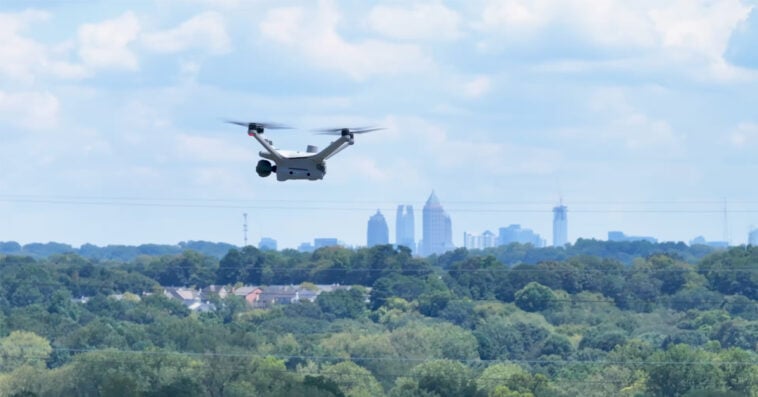Picture this: a drone zipping through the parking lot, tracking a group of suspected shoplifters before they can make their getaway. It may sound like a scene straight out of a sci-fi thriller, but for retailers facing a surge in organized theft, it could soon be an everyday reality. As stores across the country grapple with brazen shoplifting and rising losses, the era of static security cameras and lone guards is giving way to something far more dynamic: drone security. With systems like Flock Aerodome Drone as Automated Security (DAS) ready to launch at the sound of an alarm, retailers are betting big on these high-tech “guards in the sky.” But could this futuristic fix take retail safety to new heights or open a Pandora’s box of privacy concerns?
What is Flock Aerodome DAS?
Atlanta-based Flock Safety, a public safety technology company specializing in intelligent crime prevention and surveillance solutions, is taking aerial security to the next level with its Flock Aerodome Drone as Automated Security (DAS), a cutting-edge system designed for private enterprises that need round-the-clock protection across sprawling sites. The technology empowers security teams to deploy drones at a moment’s notice across various facilities, including transportation hubs, energy plants, hospitals, logistics centers, and retail complexes.
Built to deliver instant aerial visibility and broader site coverage, the Aerodome DAS can automatically launch when triggered by an alarm or at the operator’s command, ensuring rapid response during potential threats or breaches. Flock Safety claims that the system not only enhances detection and response times but also helps reduce costs associated with false alarms and the reliance on on-site security guards.
Evolving from the company’s proven Drone as First Responder (DFR) platform, already trusted by law enforcement agencies nationwide, this new iteration extends that same level of high-tech, automated security to the commercial sector, signaling a new era of “eyes in the sky” for private security.
How does Flock Aerodome DAS work?
Developed by Flock Safety, a public safety technology company known for its data-driven security and surveillance systems, the Flock Aerodome Drone as Automated Security (DAS) is designed to provide fast, autonomous aerial response across wide areas. Each Aerodome dock can cover a radius of approximately 3.5 miles and supports flights lasting up to 45 minutes, giving operators the ability to monitor expansive sites with minimal delay.
Upon receiving a camera or audio alert, operators can deploy the drone with a single command, after which the unit autonomously navigates to the target location and streams live high-definition and thermal video back to the control center. The system also integrates seamlessly with existing alarm panels, video management systems, and access control platforms, enhancing coordination within established security infrastructures.
To ensure safe and reliable operation, the system complies with the Federal Aviation Administration’s Part 107 regulations and utilizes site-specific approvals and waivers, including Beyond Visual Line of Sight (BVLOS) operations where applicable. Advanced features such as geofencing, obstacle avoidance, precision landing, and detailed flight activity logging guarantee safe and compliant operations. To further support clients, Flock Safety offers deployment assistance, operator training, and continuous customer support to maintain reliability and regulatory compliance.
The surge in shoplifting and how drone security might turn the tide
In recent years, the U.S. has seen a sharp escalation in shoplifting, and the pandemic appears to have catalyzed deeper and broader issues. A study by the National Retail Federation found that by 2023, the average number of shoplifting incidents per year had jumped 93% compared to 2019, with a nearly identical increase in dollar losses. Retailers reported an average of 177 shoplifting incidents per day in 2023, though that number varies widely depending on the type of retail business.
Much of this increase is linked to organized retail crime — coordinated groups targeting multiple stores, sometimes across jurisdictions, stealing high-value goods for resale. There has also been a rise in more aggressive behavior associated with these thefts; many retailers report that shoplifters are more brazen and confrontational than in past years.
Given this surge, traditional security methods like static cameras, in-store guards, and alarms are often stretched thin. They may catch incidents after the fact, but struggle to prevent thefts in progress, especially when thieves act fast or in coordinated groups. This is where systems like Flock Aerodome DAS can make a difference.
The growing debate over drone surveillance privacy
While Flock Safety’s drone-based security system promises faster response times and broader surveillance coverage, it also raises serious privacy and ethical concerns. Critics warn that widespread deployment of autonomous aerial monitoring could blur the line between legitimate security and invasive surveillance, especially in public or semi-public spaces like parking lots, shopping centers, and business districts.
The use of high-definition and thermal imaging cameras capable of recording people’s movements has prompted questions about data collection, retention, and potential misuse. Civil liberties advocates argue that without strict oversight, such technology could lead to unwarranted tracking, profiling, or data sharing with law enforcement without proper consent or warrants.
In Flock Safety’s terms and conditions and end user license agreement, there is a clause that video and footage access is limited to “authorized end users” via a web Interface for a defined retention period. Still, as drone security becomes more prevalent in the private sector, regulators and privacy experts continue to call for clearer transparency standards, consent policies, and accountability frameworks to balance safety with individual rights.
Source: Airport Technology

